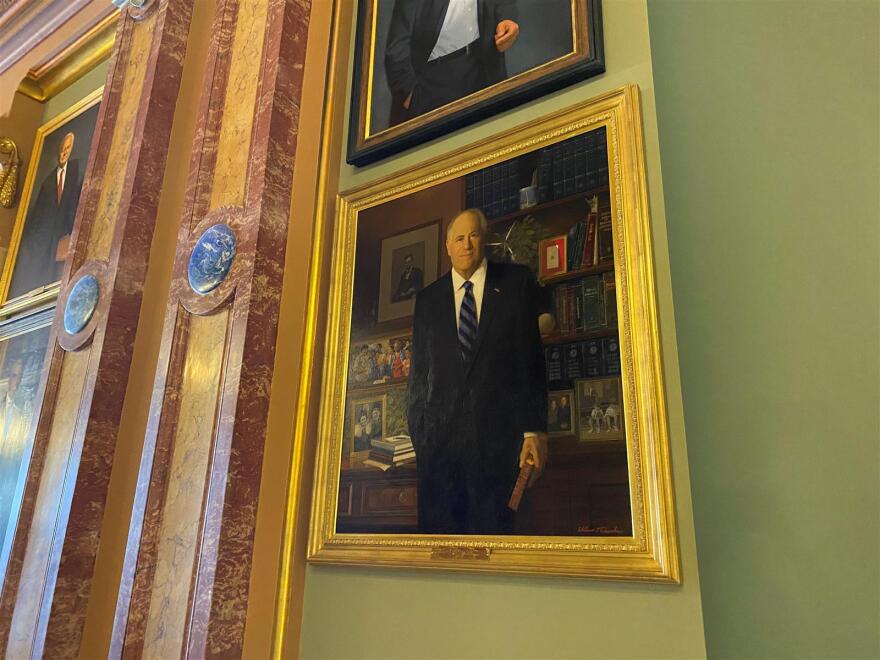The 2024 primaries in Illinois were largely uneventful, due mainly to a lack of competition in races at the top of the ballot and historically low turnout among voters.
That’s the analysis of two former Illinois governors, Republican Jim Edgar and Democrat Pat Quinn, who spoke with Capitol News Illinois Thursday after the elections. The former governors sat for an interview for Capitol News Illinois’ Capitol Cast podcast.

“Overall, I don't think this is a primary the general public or pundits will look back on and say was a watershed,” Edgar said. “Now for certain candidates who won or lost it was a watershed. As one who has lost a primary before, I know what that means. But, again, I don't think you can read a lot into this looking toward the general election in November.”
Both the Democratic and Republican presidential contests were sewn up this year a week before the Illinois primary. President Joe Biden and former President Donald Trump had both secured enough delegates to win their respective nominations after the Super Tuesday primaries March 12.
Quinn said because that race was decided and many other races were uncontested, the primary “didn’t awaken the voters.”
“I live in Cook County, and there was a big race for state's attorney … but even that wasn't all that exciting,” he said. “There was also a referendum on the ballot in Chicago dealing with the (real estate) transfer tax and helping people who are homeless. That was exciting to some, but not to the general voters.”
The real estate transfer tax measure, dubbed Bring Chicago Home, was backed by progressive Chicago Mayor Brandon Johnson. It appeared destined for failure with 57 percent of voters opposing it with 87 percent of votes counted as of Friday. The two Democratic candidates for state’s attorney were within 8,200 votes of each other as of Friday with the race uncalled.
Although final turnout numbers are not yet available, State Board of Elections spokesman Matt Dietrich said Friday that unofficial numbers from the state’s largest voting jurisdictions suggest overall turnout was probably less than 20 percent. If that trend holds, it would be the smallest turnout percentage for a primary since at least 1960.
Despite the lack of competition in the presidential race, however, each party had some lower-ballot races race that generated interest in some regions of the state.
For Republicans, the most contested race was in the 12th Congressional District of southern Illinois. There, incumbent Rep. Mike Bost faced a challenge from Darren Bailey, a former state legislator and unsuccessful candidate for governor in 2022, in a clash between two staunch supporters of former President Trump.
Unofficial results show Bost held onto the seat by about 3 percentage points.
Edgar said that race illustrated how far to the right the Republican Party has moved in recent years, and how traditional “moderate” Republicans, like himself, have all but disappeared from the party.
“I might be the last one in the party in that point of view,” he said. “Many, many people that supported me, people who worked for me, they're now either independent or they're Democrats. And as a result, the party in Illinois has moved farther to the right, which I think makes it more difficult to win statewide races.”
For Democrats, one of the most contested races was in the 7th Congressional District in Chicago, where longtime incumbent Rep. Danny Davis fended off challenges from four other individuals, most notably Chicago City Treasurer Melissa Conyears-Ervin. Davis received 53 percent of the vote.
Quinn, who lives in that district and has been a longtime supporter of Davis, said the results showed the 82-year-old congressman still has plenty of energy.
“The people of the 7th District like Danny Davis,” Quinn said. “They look at his programs, his policies, his energy, his enthusiasm, and they voted for him overwhelmingly compared to the other candidates. I think a couple of them got 18 – 19 percent. He got almost 50 percent. So to me, it's very clear that age in the 7th District is not as important as energy and ideas. And Danny Davis has both.”
Edgar served two terms as governor, from 1991 to 1999. Before that, he served two terms as secretary of state and one term in the Illinois House.

Since his retirement from politics, Edgar has remained active in academia. He is a distinguished fellow at the Institute of Government and Public Affairs at the University of Illinois Urbana-Champaign. There, he established the Edgar Fellows Program that focuses on developing leadership in government.
Quinn, a former lieutenant governor, rose to the governor’s office in 2009 when then-Gov. Rod Blagojevich was impeached and removed from office. He was elected to a full term in 2010 but lost his reelection bid in 2014 to Republican Bruce Rauner.
Since leaving office, Quinn has remained active in public affairs. He ran unsuccessfully for attorney general in 2018, losing the Democratic primary to state Sen. Kwame Raoul, who went on to win the general election. He also continues to speak out on public affairs, most recently endorsing a Republican proposal in the General Assembly to give citizens more power to pass state constitutional amendments regarding ethics reform.
Capitol News Illinois is a nonprofit, nonpartisan news service covering state government. It is distributed to hundreds of newspapers, radio and TV stations statewide. It is funded primarily by the Illinois Press Foundation and the Robert R. McCormick Foundation, along with major contributions from the Illinois Broadcasters Foundation and Southern Illinois Editorial Association.






